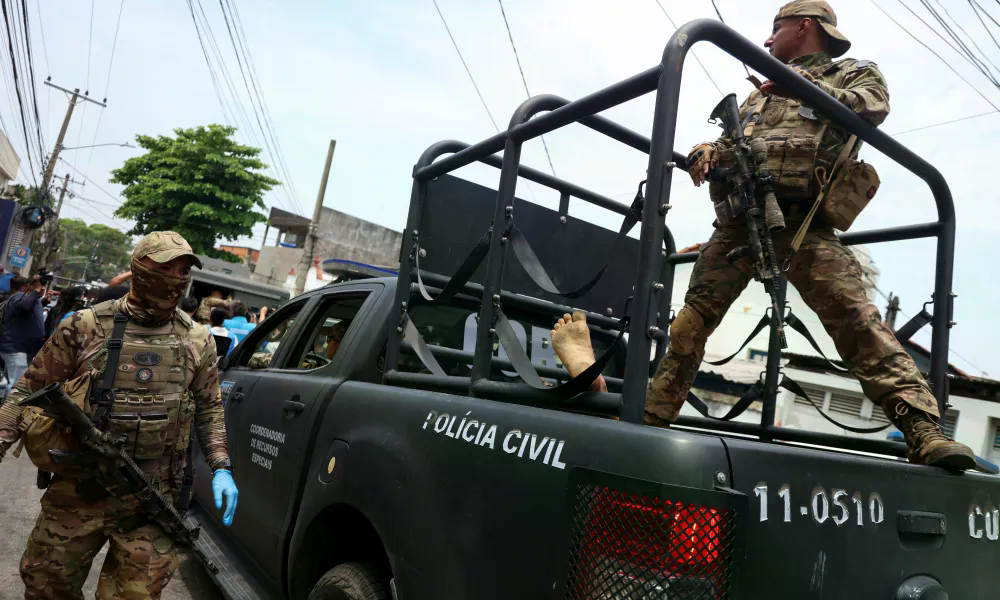
At least 60 people, including four police officers, have been killed in a law enforcement operation in Rio de Janeiro, Brazil, according to local media reports. The incident has sparked widespread concern over the escalating violence and the impact on civilian populations.
On Tuesday, a Brazilian news outlet reported that the death toll had risen to 64, though the government has not yet officially confirmed the figure. The raid, aimed at curbing drug trafficking in the northern part of the city, is now considered the deadliest police operation in the region’s history. Authorities described the action as part of “Operation Containment,” an initiative targeting drug trafficking and organized crime.
The gang Comando Vermelho, also known as the Red Command, was one of the primary targets of the operation. The state government called it the largest ever directed against the group. Governor Claudio Castro stated on social media that the operation sought to combat the territorial expansion of the gang and capture criminal leaders from Rio de Janeiro and other states. He noted that up to 2,500 officers participated in the raid, some equipped with armored vehicles and helicopters.
The operation focused on the Alemao and Penha favela complexes, densely populated low-income areas on the outskirts of the city. Footage shared by Castro showed armored vehicles patrolling the streets and rows of suspects being handcuffed. At least 56 individuals were arrested, as authorities served 250 arrest and search warrants.
However, gunfire erupted during the operation, resulting in dozens of deaths and injuries. Road closures were implemented, and initial reports suggest that stray bullets may have struck bystanders. The violence has raised concerns about the safety of civilians and the effectiveness of such operations.
Comando Vermelho is recognized as the dominant drug-trafficking organization in Rio de Janeiro, exerting influence over many of the city’s poorer neighborhoods. Other criminal groups also maintain significant control over parts of the state. According to Al Jazeera correspondent Monica Yanakiew, 60% of the territory in the state of Rio de Janeiro is either controlled by drug gangs or by militias—former police officers who charge residents for so-called security services.
In the 1980s, Comando Vermelho became a major player in the global cocaine trade, collaborating with Colombian cartels and Amazonian traffickers to distribute illicit narcotics. Brazil ranks second worldwide in cocaine consumption, behind only the United States. In 2023, more than 180,000 incidents involving cocaine trafficking were documented, with nearly 130,000 kilograms of the drug seized, according to government data.
Police raids against criminal organizations are common in Brazil’s favelas, often resulting in fatalities. In 2024, approximately 700 people died during police operations in Rio, averaging nearly two deaths per day. One of the most lethal raids occurred in 2021, when armed police stormed the Jacarezinho favela, killing at least 25 people. Al Jazeera reported seeing homes riddled with bullet holes and blood flowing through the streets.
Residents in the area have expressed outrage over the recent violence. Yanakiew spoke to relatives of victims who were upset by the casualties. “There are some 20 bodies up the hill, which they can’t take to the hospital,” she said, gesturing around her. She added that with Brazil heading into a national election in 2026, the issue of criminal violence and drug trafficking is expected to play a central role in political discourse.
Incumbent President Luiz Inacio Lula da Silva has announced plans to run for re-election, but he faces criticism from the right wing, which advocates for classifying criminal gangs as terrorists. Human rights groups have also raised questions about the timing of large-scale police operations, particularly before major international events.
Next week, Rio de Janeiro will host the C40 World Mayors Summit and Prince William’s Earthshot Prize, which recognizes environmental achievements. Additionally, Brazil is set to welcome world leaders for the United Nations climate summit, COP30, in the Amazonian city of Belem, beginning November 10.


